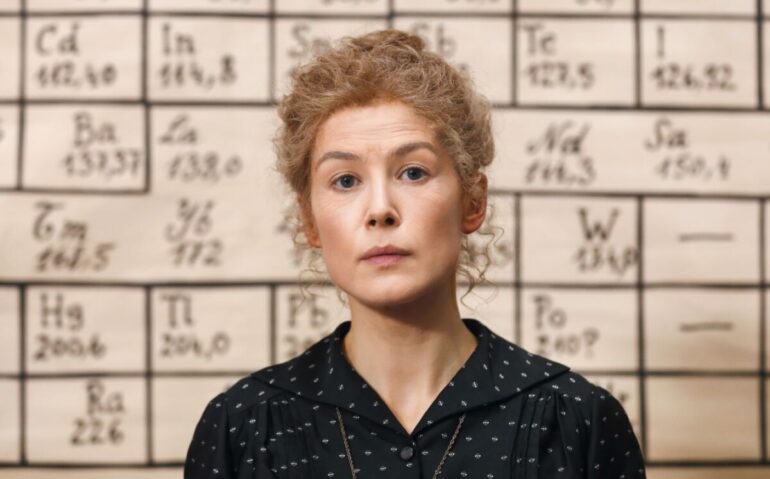From that rather obvious title, you should have guessed that this is a biopic about Marie Curie (Rosamund Pike), and if you didn’t, well, shame on you. However, I wouldn’t actually blame you if you didn’t immediately know that this is a biopic about her, since the first twenty minutes or so is focused on Curie’s love story with her husband Pierre (Sam Riley). They even have a meet-cute where they bump into each other in the street and Curie drops her papers or something. Radioactive is an adaptation of the graphic novel Radioactive: Marie & Pierre Curie: A Tale Of Love And Fallout, which explains the focus on the love story and over-the-top visuals.
Don’t get me wrong, the visuals accompanying this love story are quite breathtaking at times, with the two frolicking by a lake with long, languid moments, the pair basking in each other’s presence. The film needs us to know that Pierre played an essential role here, since he believed in her and helped push her work into a productive space.
The science, however, is reduced to a montage, with Pike’s Curie shovelling coal and iron, or engaged in fractional crystallization, and even these brief moments are interrupted by romps in a darkened room and Curie going into labour. Perhaps this is the film’s way of showing Curie’s ability to devote herself to her work, all while being a dedicated wife and mother. Maybe I wanted a bit more focus on Curie’s life and work, instead of this speeding through of key moments.
Radioactive is more concerned with showing us the impact of their work, making a beeline towards the future and the use of radiation in cancer treatments, as well as the weaponising of their discovery. None of these flash forwards do anything, coming across more as a clinical stating of facts as opposed to showing the weight of their scientific achievements. It also takes away from the cinematic space the film has already created. The scenes of 19th century Paris have a gothic feel, with strolls down dark streets and visits to seances, but this is then undercut with these random travels to the future. Oh, we travel to the past as well, but there is nothing of significance there, merely to belabour the point that her mother’s death affected Curie emotionally.
Pike’s presence is the most dynamic thing about the film, with everyone else pretty much developed to the point of paper. Sam Riley’s Pierre is alright, I suppose: he doesn’t weigh the film down, but he doesn’t add much to it as well. Ironically, the film just has too many unstable elements, with style overwhelming what little substance there is. It is disjointed and artificial, when the main selling point of a biopic is the humanity of the subject. Yes, you could never accuse Radioactive of being formulaic, but it offers the viewer barely any emotional skin to sink their teeth into.
Considering that director Marjane Satrapi’s previous work was Persepolis, it does suggest that this adaptation would have succeeded more as an animated film. As it is, the effect of the film is simply too disorienting for the viewer, and instead of admiration we end up feeling alienated from Marie and her life’s work – a scientific mind like Curie deserves better.
Review screener provided
Some of the coverage you find on Cultured Vultures contains affiliate links, which provide us with small commissions based on purchases made from visiting our site. We cover gaming news, movie reviews, wrestling and much more.




